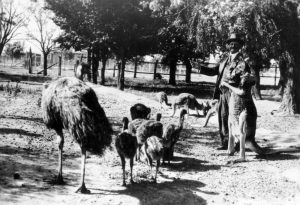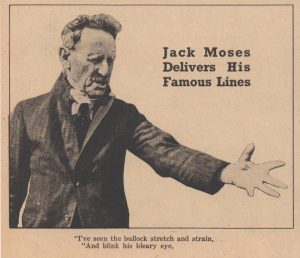
He was born in George Street, Sydney (New South Wales), on 12 January 1861. As his name indicates, Jack Moses came from Jewish ancestry, although he was an adherent of the Church of England (when he died, he was buried with Anglican rites). His father, also named John Moses, was an English storekeeper; his mother, Mary Ann Moses (née Shea), was an Australian of Irish background.[1]
In his capacity as a wine salesman, Jack travelled all over New South Wales, as well as into Queensland and Victoria. His widespread travelling gave him many opportunities to indulge in his love of reciting poetry and bush ballads to country audiences. He was well-known throughout New South Wales because of his recitations at country shows around the state.
In his writings, Jack Moses displayed a great love for the regional districts of Australia. In his book Beyond the City Gates: Australian Story & Verse he virtually acted as an unpaid publicist for country areas, using his stories to tell of the benefits of life in the country and to encourage city folk to move there. He was a great promoter of “Bush Week”, during which shops in Sydney devoted store windows to products from the country, as a way of pushing the virtues of country living and country produce.[2]
The Coffs Harbour and Dorrigo Advocate sang his praises in 1932:
“Mr. Jack Moses, the wine traveller who attends numerous country shows … probably is better known throughout the State than any other man. He is a great entertainer and writer of verse … He is also a great friend of the country dweller and producer.”[3]
Frank Morton, who wrote an introduction about Jack Moses for Beyond the City Gates, spoke highly of him:
“I wandered into the old theatre at Hobart and heard a man reciting bush-verse better than I had heard any man recite it before. … This man in the old Hobart theatre was, of course, my friend Jack Moses, whom that night first I met. … Jack is an optimist, a friend of man, a lovable cuss, and every blackguard of us is his brother. On the male side, he is the happiest thing I know about Australia. … Jack sees the genial Australian as he is, and as I have found him.”[4]
Moses was a close friend of the author Henry Lawson. In his poem “Joseph’s Dreams and Reuben’s Brethren” Lawson makes reference to him, saying “My best friend was a Yid”. Jack Moses once said of Lawson, “Anything I know of writing verse I owe to Henry Lawson, who inspired me, as he was a genius born.”[5]

“Jack Moses loved the crowds — he had a joke for every occasion — and it was inevitable that someone would eventually call upon him to recite. Without missing a beat, he would launch into one of his ‘bush jingles’, as he called them. Jack’s jingles became so popular that he published two books of his verse, and both were best-sellers. … even in retirement, he worked the streets, entertaining passers-by with his poems and handing out postcards printed with some of his best known verse. When he died at the age of 85, in 1945, Jack was still writing poetry and claiming to be the last of the bush troubadours.”[6]
Even though he made many appearances at country fairs, gave lots of public poetry recitations, and wrote two books, he will always be best remembered for “Nine Miles from Gundagai”. Regarding that poem, the The Sun (Sydney, NSW) declared:
“if he had never penned another line in his life Moses would deserve immortality for this”.[7]
Jack Moses died at the Royal Prince Alfred Hospital, Camperdown (NSW) on 10 July 1945. He is buried in the South Head cemetery (Vaucluse, Sydney, NSW). His contribution to bush poetry was an important one, which should not be forgotten.
Books by Jack Moses:
1923: Jack Moses, Beyond the City Gates: Australian Story & Verse, Sydney: Austral Publishing Co.
1938: Nine Miles From Gundagai, Sydney: Angus & Robertson
The poem “Nine Miles from Gundagai”:
1919: How history was made: “The Dog Sat on the Tucker Box”
Published in The Gundagai Times and Tumut, Adelong and Murrumbidgee District Advertiser (Gundagai, NSW), 25 November 1919
1923: Nine Miles from Gundagai: The Dog and the Tucker Box
Published in Beyond the City Gates: Australian Story & Verse (1923)
Note: The 1919 copy of the poem differs slightly from the version published in the 1923 book. The 1919 copy uses “Five miles”, instead of “Nine miles”; and, on the 7th line, “sat”, instead of “sit”.
Articles about Jack Moses:
Jack Moses [book review, 20 April 1924]
A brief review of Beyond the City Gates.
The man who wrote “Nine Miles from Gundagai” [29 January 1938]
A brief article about Jack Moses, with several photos of him reciting his famous poem, as well as photos of two “Dog on the Tucker Box” monuments (outside of Gundagai, at the five-mile and nine-mile points).
Gundagai’s mysterious dog: Origin of “The Tucker Box” story unknown [7 April 1938]
An article about the “Dog on the Tucker Box”, including some comments regarding Jack Moses.
Creator of Dog on Tucker Box: Jack Moses dead [11 July 1945]
An obituary of Jack Moses.
Jack Moses dead: Well-known country show identity [13 July 1945]
An obituary of Jack Moses.
References:
[1] Martha Rutledge, “Moses, John (Jack) (1861–1945)”, Australian Dictionary of Biography, National Centre of Biography, Australian National University
[2] “A hardy perennial: Mr. Jack Moses, The Grenfell Record and Bland & Lachlan Districts Advertiser (Grenfell, NSW), 23 August 1934, p. 5
“Jack Moses dead: Well-known country show identity”, The Narandera Argus (Narandera, NSW), 13 July 1945, p. 1
[3] “20 guinea cup: Moses Encourages pig breeding”, Coffs Harbour and Dorrigo Advocate (Coffs Harbour, NSW), 6 September 1932, p. 4
[4] Frank Morton, “Introducing Jack Moses”, in: Jack Moses, Beyond the City Gates: Australian Story & Verse, Sydney: Austral Publishing Co., 1923, pages 9-10
[5] John Laws and Christopher Stewart, It Doesn’t End There, Sydney: Pan Macmillan Australia, 2006, p. 113
Henry Lawson, “Joseph’s Dreams and Reuben’s Brethren: A Recital in Six Chapters”, Truth (Brisbane, Qld.), 15 August 1915, p. 11
Henry Lawson, “Joseph’s Dreams and Reuben’s Brethren: A Recital in Six Chapters” (1904), in: Leonard Cronin (editor), A Fantasy of Man: Henry Lawson Complete Works, 1901-1922, Sydney: Lansdowne, 1984, pp. 205-216 (see p. 213, 2nd column, last stanza)
George Gunn, “Henry Lawson — Jack Moses, The Grenfell Record and Bland and Lachlan Districts Advertiser (Grenfell, NSW), 11 July 1946, p. 5
[6] John Laws and Christopher Stewart, It Doesn’t End There, Sydney: Pan Macmillan Australia, 2006, pp. 113-114
[7] Jack Moses, The Sun (Sydney, NSW), 20 April 1924, p. 17
[photo] a) Jack Moses, State Library of Queensland
b) Jack Moses, Trove (National Library of Australia)
[a black and white photo of Jack Moses posing with some kangaroos and emus]
Further information:
Jack Moses, Wikipedia
Leave a Reply